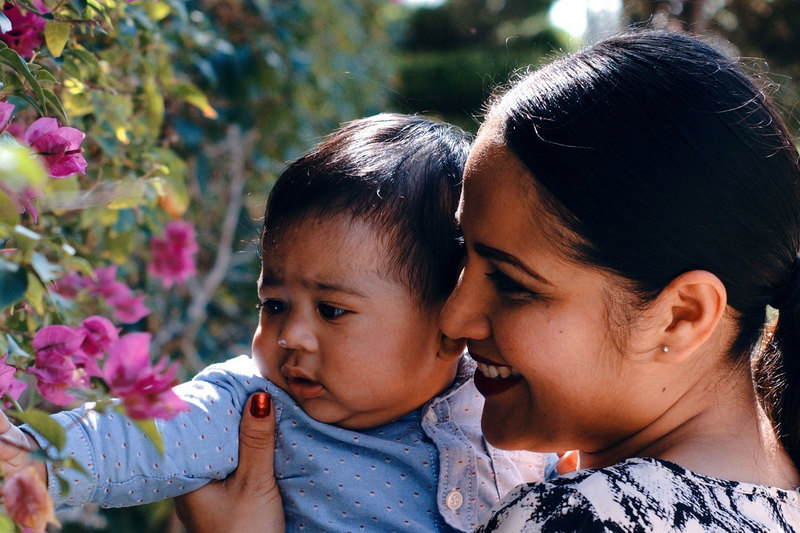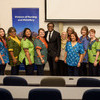Helping parents and their babies through the first 1 000 days
28 August 2020 | Story Carla Bernardo. Photos Laura Garcia / Pexels. Read time 6 min.
The first 1 000 days of being a parent and of your baby’s life can be overwhelming. There’s a lot to adjust to, particularly transitioning from pregnancy to birth and then to childcare. Unfortunately, access to adequate and accurate information can be difficult to come by for many new parents.
This is why University of Cape Town (UCT) PhD candidate Sarah Dsane-Nsor is researching how parents are using digital resources within the first 1 000 days (FTD) and how this supports parenting and childcare needs. She is also working on delivering FTD resources to parents via WhatsApp.
Based in UCT’s Department of Computer Science, Dsane-Nsor is in her second year of research, specialising in the field of human–computer interaction. The study’s focus is bandwidth-constrained communities (those with limited online accessibility) in Cape Town. This is primarily due to infrastructural deficits, the high cost of data and/or poor network connectivity.
She is also exploring how bandwidth constraints affect parents’ information-seeking behaviour, their social media interactions and the role of faith-based organisations in supporting parents during the FTD.
“Healthy parents and children translate into human capital for national development.”
“If we can deliver adequate and reliable FTD information to parents, we are helping to promote healthy mommies and strong and smarter children, while simultaneously reducing low-birth-weight babies and maternal and child mortality,” said Dsane-Nsor.
Added to this is that “healthy parents and children translate into human capital for national development”.
The PhD candidate is hoping that her research will assist in extending the reach and accessibility of FTD information to parents. She anticipates that this will translate into positively changing the trajectory of their children’s lives and will contribute to realising the Sustainable Development Goals of reducing maternal and child morbidity and mortality. She further hopes her work will inform local policy and have implications for the design of locally relevant content and the dissemination of FTD information to parents in bandwidth-constrained communities.
“This is very important to ensure that parents, despite their socio-economic status, can relate to and understand the FTD content,” said Dsane-Nsor.
Interesting findings
Currently in the data collection and analysis stage of her research, Dsane-Nsor has already come across a number of interesting findings. One is that today’s parents – both mothers and fathers – are particularly curious about information. Another is that fathers are as vulnerable during the FTD as mothers.
“Whether as couples or partners, fathers are eager to learn, support and be part of the process and should be encouraged.”
Through her research she has witnessed the steadily evolving roles of fathers.
“Fathers are excited about antenatal visits, childcare and seeking information online and offline to become better at it,” she said.

One setback, however, is that most FTD online resources are designed for mothers. For this reason, and based on her further findings, Dsane-Nsor is advocating that the human–computer interaction community and health and well-being content creators consider:
- taking a bottom-up approach where parents are encouraged to provide peer support and create content
- designing gender-neutral FTD content to speak to the evolving roles of mothers and fathers and to ensure a balanced understanding of childcare
- that faith-based organisations play a significant role in behavioural change, are influential community members and are therefore “excellent avenues for disseminating FTD resources and supporting parenting emotionally, physically and spiritually”
- that bandwidth-constraint is a limiting factor in accessing additional FTD resources online.
In response to the final point, Dsane-Nsor originally intended to co-design offline FTD resources with parents and distribute them on the iNethi platform, which is available at faith-based locations and carries no data charges. The social distancing required by the COVID-19 lockdown meant that this plan evolved to include WhatsApp.
Challenges and next steps
While Dsane-Nsor continues with her research as best she can, the process has been severely affected by the COVID-19 pandemic – but she maintains her enthusiasm.
“You know, life will throw setbacks at you – they are temporary. Take time to stop, breathe, reflect, pick up the pieces and plan a new approach.
“You don’t give up. This is because everything well-achieved is only with determination and trusting God to carry you through.”
“As parents seek information across different platforms, they find varying answers that may be overwhelming and sometimes confusing.”
While her fieldwork might be temporarily on hold, Dsane-Nsor will continue work on establishing a facilitated platform on WhatsApp where parents will be supported with appropriate FTD resources.
“Our findings suggest that most parents are signed up to WhatsApp primarily because it is cheap and flexible to use,” she said.
“We also find that as parents seek information across different platforms, they find varying answers that may be overwhelming and sometimes confusing.”
Therefore, the platform will have at least one expert available to facilitate conversations and provide supporting materials to watch and learn from as the parents navigate the first 1 000 days of their new babies’ lives.
 This work is licensed under a Creative Commons Attribution-NoDerivatives 4.0 International License.
This work is licensed under a Creative Commons Attribution-NoDerivatives 4.0 International License.
Please view the republishing articles page for more information.










